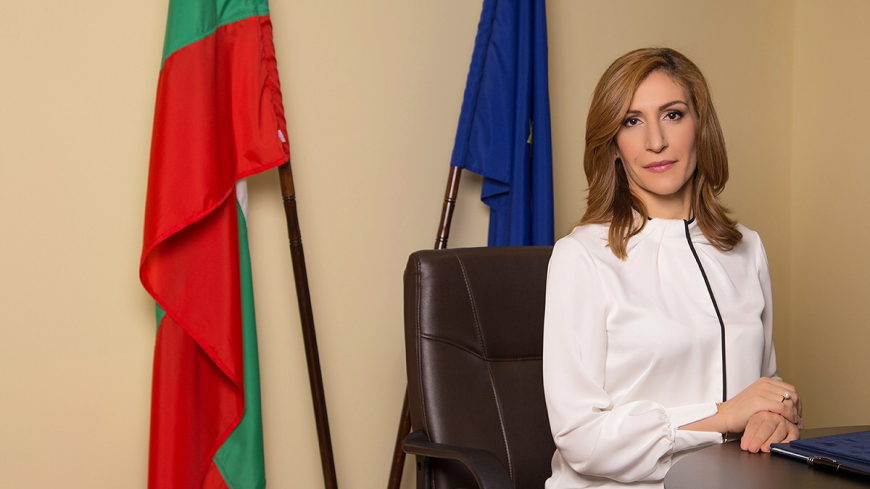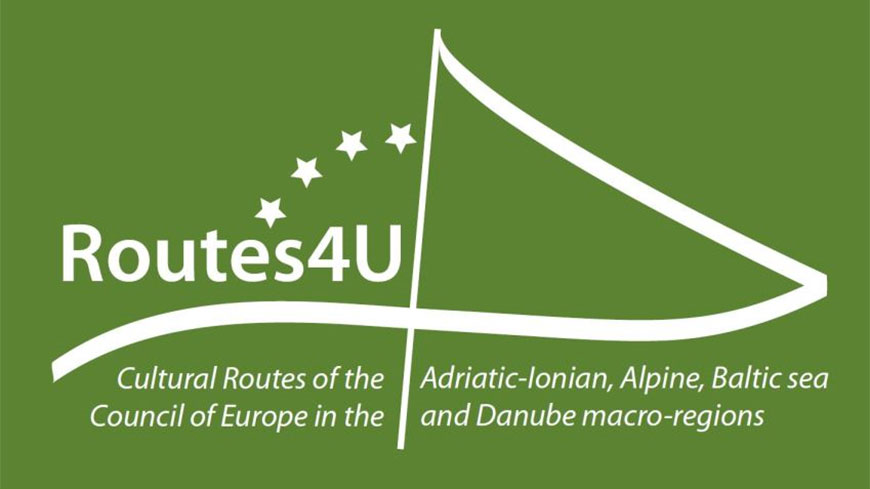We invite Ms Nikolina Angelkova, Bulgarian Minister of Tourism, to tell us more about the Presidency of the Danube region (EUSDR), her views on the opportunities and challenges regarding transnational cooperation and the Routes4U Project.
Ms Nikolina Angelkova is Minister of Tourism of the Republic of Bulgaria. In October 2017, Bulgaria took over the presidency of the EU Strategy for the Danube Region for a period of one year. The Ministry of Tourism is also one of the coordinator in the Danube Region for the Priority area 3 "To promote culture and tourism, people to people contacts".
During the 6th Annual Forum of the Strategy for the Danube Region (18-19 October 2017), Bulgaria accepted officially the Presidency of the European Union Strategy for the Danube Region for one year. Could you tell us what does the Presidency represent for Bulgaria, and more specifically for the Ministry of Tourism?
The Bulgarian Presidency of the EU Strategy for the Danube Region between October 2017 and October 2018 is a very good opportunity for the Ministry of Tourism to focus on Priority Area 3 “To promote Culture, Tourism and People to People Contacts”. The Bulgarian Presidency of the Danube Strategy coincides with the Bulgarian Presidency of the Council of the European Union in the first half of 2018 and the European Year of Cultural Heritage.
For the Ministry this is an opportunity to promote our culture and the Thracian and Slavic cultural heritage in the country. Bulgaria is third in Europe in number and variety of cultural monuments with more than 40 000 registered tangible cultural monuments.
Seven of them and two natural sites are recognized as unique sites of world importance and are included in the UNESCO World list heritage. Rich cultural heritage contributes to the development of the Bulgarian tourism, which has been steadily growing in each of the last years.
The Bulgarian Presidency of the Danube Strategy also gives us the opportunity to focus on promoting culture and tourism in the region. The topic of the Seventh Annual Forum of the Danube Strategy is related to the development and preservation of cultural heritage and sustainable tourism. The forum will take place in Sofia on October 18th and 19th 2018. A meeting of ministers responsible for tourism development in the respective countries in the Danube Region will be held during the first day. The Annual forum is an opportunity to discuss preservation and development of cultural heritage and tourism. The region has very rich and diverse culture, which is relatively less well-known and has great potential for development.
The EU Strategy for the Danube Region (EUSDR) comprises 14 countries, which represent one fifth of the population of the European Union (over 100 million of people). Could you tell us what are the main opportunities and biggest challenges in regard to this transborder cooperation for the tourism sector?
The Danube region is very rich in cultural and historical heritage and this is one of its main advantages. It is important with its variety of languages, culture, cuisine and exceptional nature. At the same time, the region is relatively less-known compared to traditional European destinations, and that is one of its main advantages - it has great potential for development of tourism.
I think that the countries in the region have realized that their strength is in cooperation, joint promotion and creation of common touristic products.
At the same time, from economic point of view, countries in the Danube region are very different. For example, Germany and Austria are among the most developed economies in the EU; in the Danube region they cooperate with Central and Eastern European Countries, Ukraine and Moldova. On the other hand, in the Danube Strategy, the majority of countries are members of the EU, others aspire to EU membership and third are neighboring countries. Different states and regions have different access to funding, both national and international, including EU funding. Access to European funds is particularly important for the countries in the Danube region, as it is a major source for the implementation of joint projects. Therefore, I believe that it is important for the new EU financial framework beyond 2020 to increase or at least to secure the same amount of funding for territorial cooperation.
Another challenge that I would like to mention, not only for the tourism sector, is the promotion of the Danube Strategy and its achievements. Implementation of the Strategy is not limited only to indicators such as the number of joint projects or the amount of allocated funding. It creates the possibility to put on the agenda of national authorities or the European Commission common local and regional needs and problems.
Routes4U Project aims to strength sustainable development in the four EU macro-regions, as recognized by the Faro Convention and through the Cultural Routes of the Council of Europe. The Cultural Routes are transnational networks certified by the Council of Europe: they promote our shared European heritage, but also how this same heritage has unique features at local, regional and national level. How would you like to cooperate with us in order to improve diversification of tourism offer and responsible tourism management in Bulgaria and the Danube region?
The Ministry of Tourism attaches great importance to the development of various tourist routes, including cultural routes.
We have developed 8 cultural and historical routes in Bulgaria that include the richness of the Northwest region: The Valley of Roses and Thracian Kings; The sea fortresses of Bulgaria; Capitals and cities of the Bulgarian tsars and patriarchs; Bulgarian architecture and craftsmanship; The magic of the Eastern Rhodope mountain; Sofia Sveta Gora and the Struma River. Under development are also 12 wine-culinary destinations, which will present riches of different regions of Bulgaria.
During the Meeting of tourism ministers of the EU Member States, the Western Balkans and Turkey on 13 February 2018 in Sofia, the idea of creating a common Balkan touristic route emerged. Creation of such common route would unlock the collective potential of the Balkan cultural heritage and in the long term would become a powerful marketing tool for the Balkan countries and the region as a whole. Its goal is to provide better access to both traditional markets and emerging markets such as China, Japan and India. As a beginning, the Balkan route will include UNESCO sites from different countries. In this connection, we could collaborate with the Cultural Routes Program of the Council of Europe, and in particular with Routes4U Project in order to share experience in the creation of the common Balkan route, which could be certified by the Council of Europe.
Another possible area of cooperation is within Priority area 3 of the EU Strategy for the Danube Region, where the Ministry of Tourism is a coordinator. One of the objectives of the Priority Area is creating new and develop existing cultural routes in the Danube region and we could cooperate by exchanging experience with the Council of Europe Cultural Routes Programme.
More information
- Routes4U Project: www.coe.int/routes4u
- Ministry of Tourism, Republic of Bulgaria: www.tourism.government.bg/en
- EU Strategy for the Danube Region (EUSDR): www.danube-region.eu


